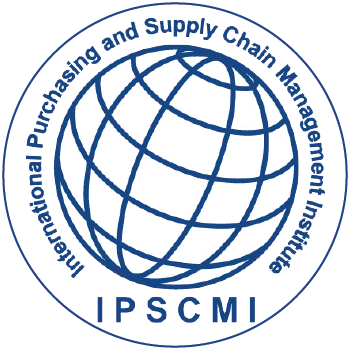This Procurement certification provide an in-depth understanding of the increasingly complex technical aspects of procurement and substantially increase the chances of career progression. Professionals with this qualification often go on to build a rewarding career in their respective industries and attain leadership positions in their organizations.

CIPP – Certified International Procurement Professional
The CIPP program is designed for all aspiring procurement professionals. It is one of the best-known procurement qualifications in the world that is suitable for individuals who are committed to implementing the best procurement and supply chain practices in their organizations. The CIPP certification validates the Procurement professional’s knowledge and dedication to follow the ethical practices in the industry. It is considered as the yardstick of excellence in the field of procurement. When certified by IPSCMI, the person is well-poised to make a difference in both his career as well as the organization that he works for.
CIPM – Certified International Procurement Manager
CIPM is an advanced level Certification in Procurement. Enrolment for CIPM is possible after obtaining the CIPP certification. The CIPM certification is specifically designed for individuals who want to enhance their career and get into the senior management level. The course will focus mostly on the strategic aspects of Procurement. The CIPM certification will highlight the skills and expertise required in the industry along with the vast knowledge needed to manage procurement for long-term benefits.
 International Purchasing and Supply Chain Management Institute (IPSCMI)
International Purchasing and Supply Chain Management Institute (IPSCMI)
The International Purchasing and Supply Chain Management Institute (IPSCMI) is a prominent professional institute offering purchasing and supply chain management certifications throughout the world. IPSCMI’s purchasing and supply chain management courses and programs are provided around the world by a complete network of alliance partners.
Learn more about this course👇
[wpforms id=”34217″ title=”false”]
Understanding the difference between procurement and purchasing – Click here
Procurement is often mistaken for purchasing. But both are different concepts in terms of the tasks involved and also what they accomplish. While purchasing is a specific function in procurement that aims to buy goods at an affordable price, procurement takes a holistic view of the entire process focusing on preparing a procurement strategy as per the company goals, supplier selection and management and also ensuring sustainable procurement.
Purchasing vs Procurement
Purchasing |
Procurement |
| Reactive process that focuses on buying goods/services for the company | Strategic and proactive process that identifies the needs of the company and the fulfilment of those needs. |
| Gives more importance to the price of the goods | Gives more importance to the value of the goods than the price |
| Straightforward process of purchasing commodities | Involves the steps that happen before, during, and after purchase |
| Includes ordering, expediting, and payment fulfilment | Includes need recognition, sourcing, and contract closure |
| Transactional–focuses on transactions than vendor relationships | Relational–focuses on creating long-term vendor relationships |
Certified International Procurement Professional (CIPP) Course Outline:
Module I: Introduction to Purchasing
- What is Purchasing
- Evolution of Purchasing
- Types of Purchases
- Understanding Purchasing Functions
- Purchasing Cycle
Module II: Procure to Pay (P2P)
- What is P2P
- The Procure to Pay Process Flow
- Automation of P2P
- Purchasing methods
- Cross-Functional Purchasing
- Centralize vs. de-centralize Purchasing
Module III E- Commerce
- Understanding e-procurement value chain
- e-procurement tools
- Evolution of e-procurement Models
- Benefits & Disadvantages
Module IV Sourcing & Supplier Management
- What is Sourcing
- Sourcing Process
- Types of Sources of Supply
- Analysis of Market Conditions
- Make vs Buy Analysis
- Types of Leasing
- Solicitation
Module V – Sustainable Procurement
- What is Green Procurement
- Scope & Potential Benefits of Green Procurement
- Implementing Green Procurement Policy
- Creating a Green procurement Program
- Approaches to Implement Sustainable Procurement
Module VI: Supplier Evaluations
- Supplier Assessments
- Supplier approvals
- Evaluation Methods
Module VII: Global Purchasing
- Why Buy Global
- Sources of Information for Overseas Suppliers
- Overcoming Global Sourcing Challenges
- True Cost of Global Buying
- Factors of Success
Module VIII: Negotiations
- Approach to Negotiation
- Content of Negotiation
- Factors in Negotiation
- Negotiation Process
- Negotiation in Relationships
- Negotiation Ethics
Certified International Procurement Manager (CIPM)
Course Outline:
Introduction to Purchasing Strategy
- World Class Purchasing
- The status of Purchasing & Supply management (PSM)
- Creating Strategic Plans & Tactics
- Planning procurement Strategies & Objectives
Logistics & Supply Chain
- What is Logistics
- Materials & Distribution Management
- Reverse Logistics
- Understanding Supply Chain Management
- Value Chain Analysis
- Supply Chain & Purchasing
Financial Decisions for Sourcing
- What is Price
- Buyers Role in Managing Purchase Prices
- Formulating Financial Strategies
- Supplier Pricing Decisions
- Price & Cost Analysis
- Standardizing Purchased Materials
International Trade
- Ocean Shipping Terminologies
- Freight Agents
- Methods of Payments (L/C)
- Incoterms 2020
Performance & Ethics
- Purchasing Performance Evaluation
- Purchasing Audit Approach
- Benchmarking & Rating
- Purchasing Ethics
- Ethical issues Relating to Suppliers
- Purchasing & Prevention of Fraud
Risk Management in Procurement
- What is Risk
- Procurement Challenges
- Common Types of Procurement Risks
- Dual Challenges of Risk Management
- External & Internal Risk Factors
- Currency Risk Management
- Steps to Risk Mitigation
Introduction to Contracts
- What is a Contract
- Essentials of Contract
- Managing Contract Compliance
- Maintaining Procurement Documents & Records
